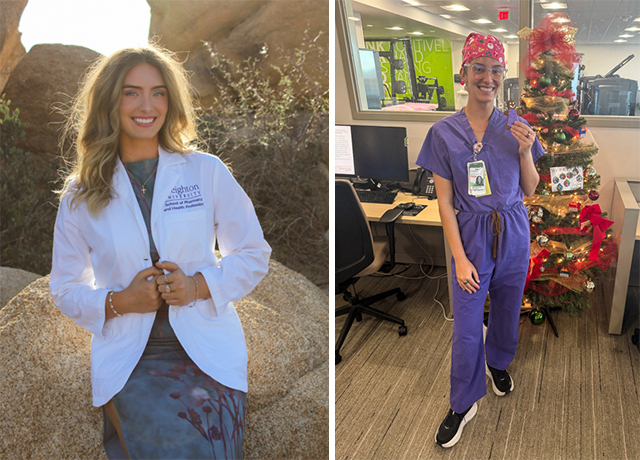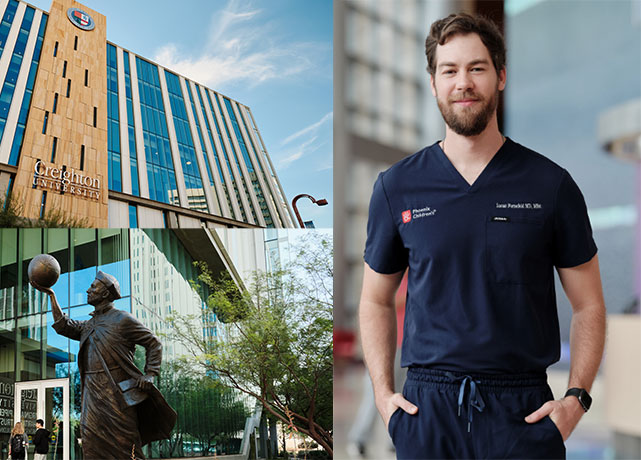Featured Testimonial About Creighton University
When I attended Creighton’s School of Pharmacy and Health Professions, these values of caring for a community really resonated with me. That was the kind of pharmacist I aspired to be.

In our Fast Forward series, we profile alumni doing unique, interesting and meaningful work in their fields, inviting each to connect the support they received at Creighton, however long past, to the person they are today. See more Fast Forward features here.
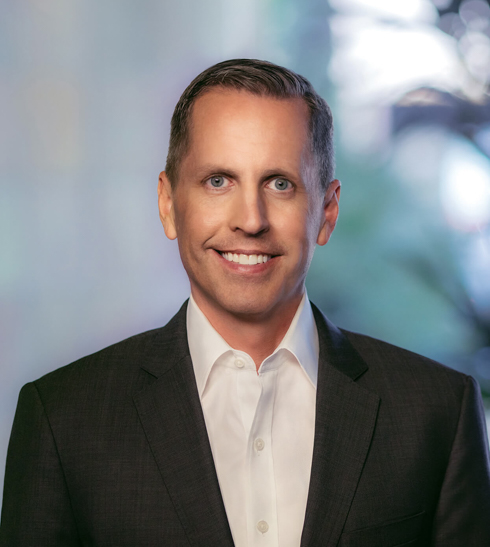
Want to nominate an alumnus for the Fast Forward series? Contact micahmertes@creighton.edu.
* * *
By Micah Mertes
Tom Utech, PHARMD’97, didn’t become a pharmacist to count pills, label vials or spend countless hours on the phone with insurance companies. Like most in his profession, he became a pharmacist because he wanted to help people.
He wanted to focus on patient-centric activities related to medication management, to deploy an education that taught him to care for the whole person and to dedicate as much of his time and energy as he could to enhancing the experience of healthcare.
Utech has made a career of streamlining the more tedious aspects of his profession. He’s made it his mission to introduce these game-changing efficiencies to all providers, as well as the patients they serve. In the process, he’s become a leader in the transformation of his industry — centralized pharmacy fulfillment.
* * *
Utech is the Chief Executive Officer of the Indianapolis-based iA, a company that provides an integrated pharmacy fulfillment platform running the process from prescription acceptance to delivery for pharmacies in a variety of volumes and settings.

iA was founded in 1972 as Innovation Associates, which once designed manufacturing processes for a variety of industries, from the U.S. Armed Forces to personal computing to aerospace. In fact, the company got its start working on the lunar test module for NASA. About 25 years ago, iA left outer space to explore another frontier: prescription fulfillment.
With U.S. pharmacies processing about 4 billion prescriptions annually, iA’s automated fulfillment reduces the manual effort involved in dispensing medications, which allows pharmacists more time for patient consultation and care.
iA’s retail partners no longer fill the majority of their prescriptions on-site. The prescriptions are instead filled in a central fulfillment facility and brought to the brick-and-mortar store for the patient to pick up the following day. iA’s fulfillment centers run on NEXiA, a leading enterprise software suite that’s the foundation of the company’s operations.
Watch a video showing an iA fulfillment center at work.
Fears of automation abound in just about every sector of the modern workforce. In the case of iA’s fully automated prescription fulfillment process, Utech said, the goal isn’t to replace pharmacists; it’s to elevate them.
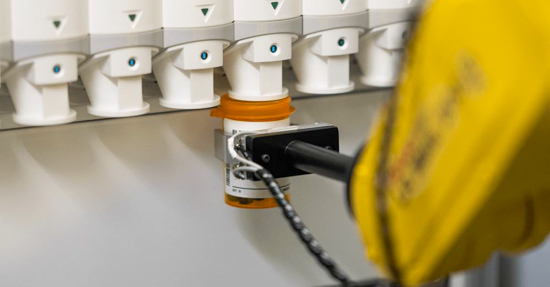
“We help empower pharmacists by alleviating pressures and time constraints and minimizing non-value-added tasks,” he said. “This approach supports the focus on the meaningful, human-centric work they trained for in pharmacy school.”
Since iA built its first fulfillment centers roughly a decade ago, iA’s customers who were at the forefront of adopting this technology have achieved remarkable success, Utech said. “While it took some time for this innovative model to really catch on, it is now experiencing rapid and widespread market adoption.”
This paradigm shift can’t come to the industry soon enough. This fall, retail pharmacies, particularly big chains, are facing nationwide staffing shortages amid their busiest time of year.
Pharmacists who have left their employers cite high levels of stress and too little time for the patient-facing parts of their job. Larger chains like Walgreens have limited their pharmacy hours due to a lack of job candidates.
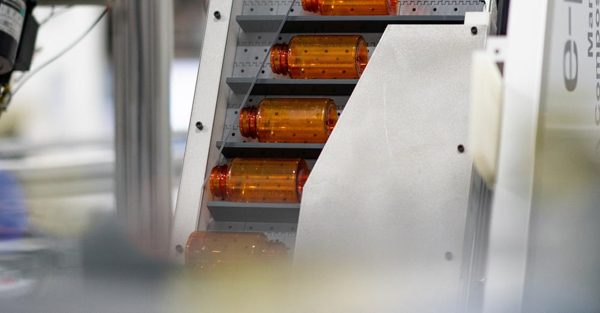
“This industry is transforming because it needs to transform,” Utech said. “While the pressures for change have existed for quite some time, COVID only accelerated it. The pandemic increased the need for pharmacists to be frontline healthcare providers because there weren’t enough physicians, physician assistants and nurses to take care of everyone.”
Even as the pandemic subsided, the pharmacist’s more prominent role in frontline patient care has remained in place. That’s a significant development, Utech said, but only if there are enough pharmacists (and only if those pharmacists have enough time) to serve their patients effectively. To ensure both will require taking a great deal of the work out of the pharmacy itself.
The cost savings of doing so will be tremendous, Utech said. If scaled, those savings could positively impact the drug reimbursement pressures pharmacies face nationwide. But the vision of iA’s model serves a more fundamental, human-focused purpose: to strengthen the connection between pharmacists and their patients, creating a more fulfilling profession for providers and a higher quality of care for all.

“iA is on the front end of an industry that’s transforming itself,” he said. “While the current landscape poses challenges for pharmacists, a brighter future awaits. We foresee a healthcare model where pharmacists will be at the center of providing frontline, patient-focused care for the communities they serve.”
* * *
Utech — who grew up in the small town of Herrington, Kansas — has long known how pivotal a pharmacist can be to a community.
“Our town’s pharmacists played a key role, not only as a center for healthcare but a central pillar of the community,” he said. “It went beyond providing prescriptions. Our pharmacist was our friend and our neighbor.
“When I attended Creighton’s School of Pharmacy and Health Professions, these values of caring for a community really resonated with me. That was the kind of pharmacist I aspired to be.”
Utech got his start leading pharmacy operations at the University Medical Center of Southern Nevada and, later, Baylor University Medical Center. In his roles, he managed the daily operations for medication management, safety and logistics across the entire provider network.
“So many times, I would see things in the hospitals or my operations in the pharmacy and think, ‘There’s got to be a better way,’” Utech said.
Later, after he had pivoted to the medical device industry, he held various roles of management for strategy, product management and marketing with the Pyxis and Alaris franchises, owned by BD — which make, respectively, automated medication-dispensing cabinets and large-volume infusion pumps. This is when he had his epiphany.
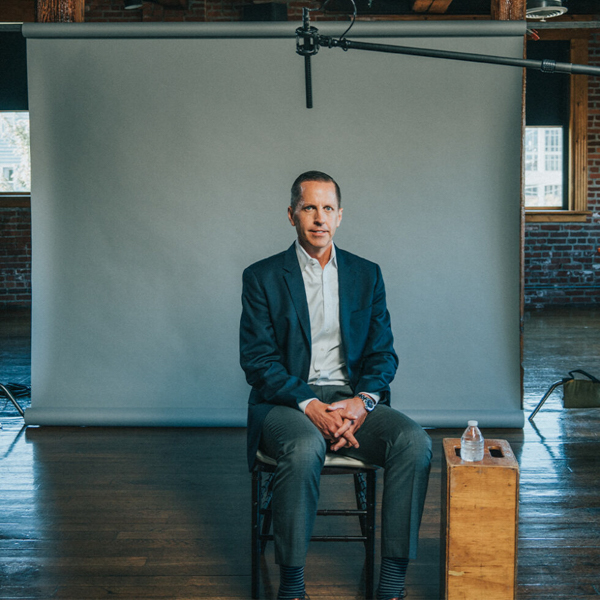
“It hit me that every decision I made was affecting millions of people every day,” Utech said. “Pyxis cabinets are used in more than 60% of hospitals; Alaris pumps are used in more than 70% of hospitals.
“If our team changed one thing about these devices, it was going to impact every patient and provider who used them. Every decision we made had to be right. The stakes were just too high to be wrong.”
It’s deeply rewarding to take on such a responsibility, Utech said, to know you have the ability to help millions of healthcare providers become more efficient and effective.
Utech joined iA in 2020, driving the company’s direction of products and software before being appointed President and COO last year. In November, he was named the company’s CEO.
This isn’t a path Utech ever could have predicted for himself; he had planned to be a frontline clinician. Yet it still fulfills the reason he became a pharmacist in the first place — to help people. He’s just doing so on a grander scale than he’d envisioned.
Today, Utech’s goals align perfectly with those of Creighton’s pharmacy program.
Both champion an endeavor that is uniquely human and distinctly Creighton — to care for the whole person in the way that only a person can.
* * *

Want to nominate an alumnus for the Fast Forward series? Contact micahmertes@creighton.edu.

